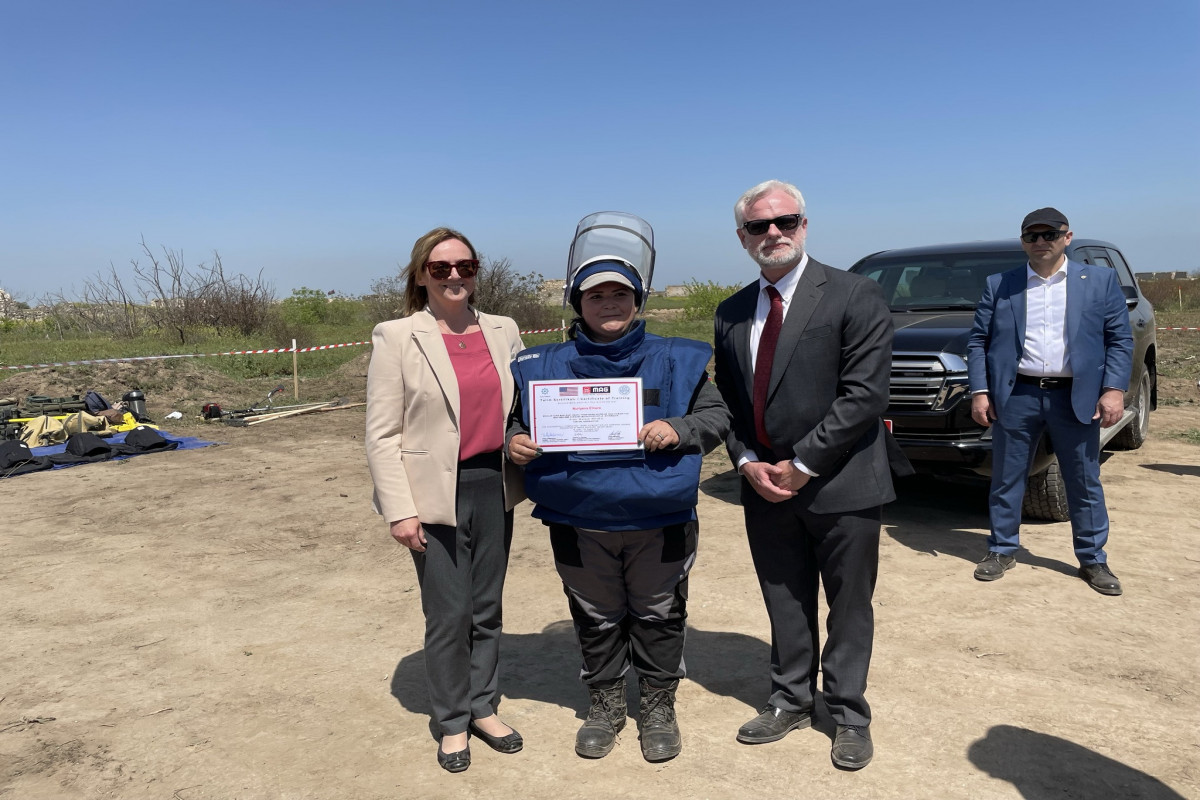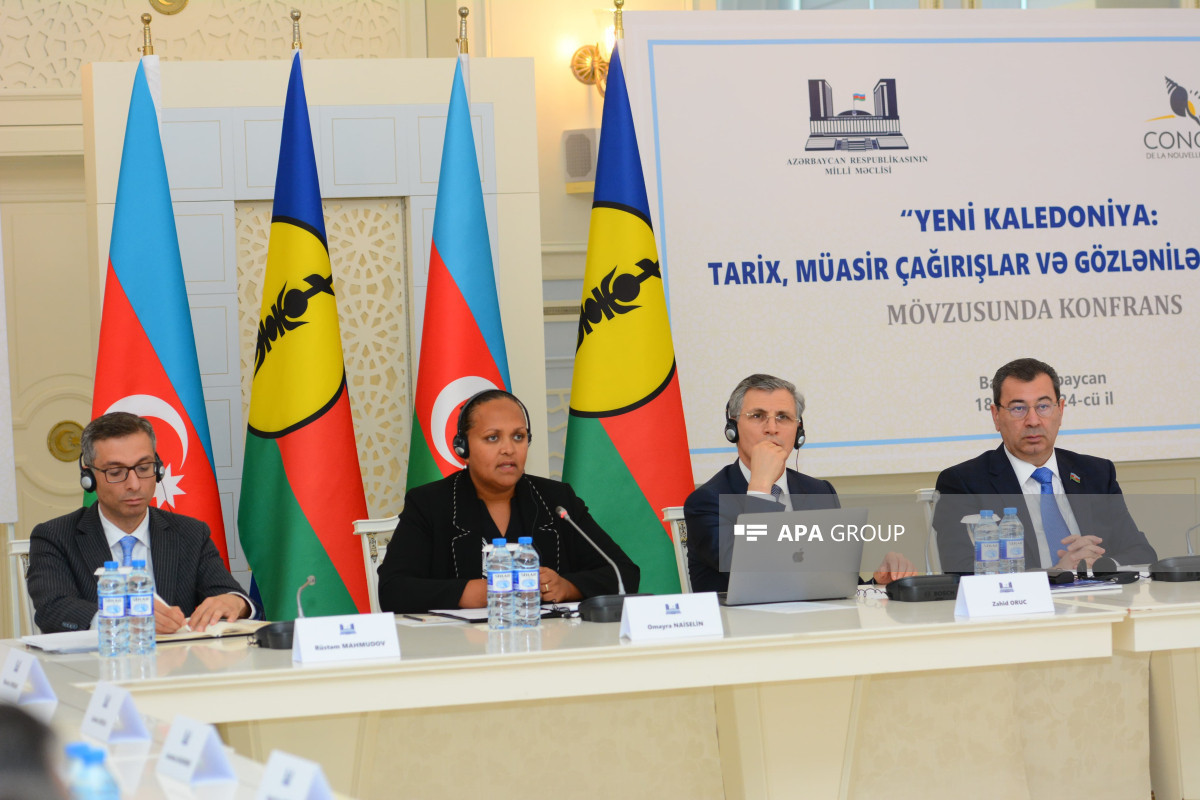Interview with APA of the extraordinary and plenipotentiary ambassador of Israel to Azerbaijan George Deek
– Mr. Ambassador, let me start with a question on the priorities of the new government of Israel. In Israel, the new government finally sworn, new Foreign Minister has been appointed. So, what will be the priorities of the new unity government in the foreign policy of Israel?
–Israel is now coming out of a very politically difficult time in our internal political affairs. As you mentioned, we were in more than 500 days without a permanent government. We had three cycles of election and the country was very much divided. No side was able to form a new coalition. So, with the level of division that has been growing, I think, the number one priority for our government right now is to heal the nation and could bring more unity and to overcome the division and come together. And I think that is what a unity government that we have now exactly embodied. That is the attempt to bridge those divisions and build bridges between the camps and try to bring together the nation of Israel.
I believe also the second priority, both domestically and globally for everyone now in the world is the Coronavirus pandemic crisis. And that goes both for the health issue and not less importantly, the economic crisis that is coming out of this pandemic. So, on the health issues, we are in Israel working very hard to maintain the levels that we have already had with the virus to keep it under control. We have had some of the best records in the world. About 18000 people who got the virus in total. Today, we have active cases, I think, 2600. But we had 298 people who died, unfortunately, but relatively, that's a small proportion. And about 29 to 30 people who are in critical condition as we speak.
So this pandemic has caused so many tragedies to families, to individuals, people who get sick. And it has also, in a way, brought us further apart. You cannot shake hands with people, you cannot visit even your grandmother, your grandfather. But also, at least on the international arena, it has also brought us closer together. We've seen nations working together. We see how the new government of Israel has now an opportunity to engage with the world in trying to combat this epidemic. I can inform you that we have had consultations and dialogue with various governments in the world to learn different know-hows and strategies and to show how we did our dealing with the pandemic. We've also had this with Azerbaijan, we've had dialogues, conversations between the professionals from the different ministries and agencies that are dealing with it. So, every threat comes with an opportunity. The pandemic is a big threat to our economy, a big threat to our health system but at the same time, it's an opportunity to remember that we're one humanity, one world, and we can work together in order to heal ourselves together. Our embassy has also tried to help the vulnerable population here in Azerbaijan, by distributing food packages to tens of families of the elderly who could not leave their home during the restrictions. And hopefully, we can also help each other in reaching a vaccine or a cure to this virus, which will allow us to go back to a somewhat more normal life. Israel is one of the leading countries in the development of the vaccine.
On the foreign affairs also, a top priority was, is, and will probably remain for the future the issue of Iran. As you know, just a few weeks ago, the Supreme Leader of Iran, Khamenei came out with some hideous remarks calling for the annihilation of the state of Israel.
You know, I'm here in Baku. I am the closest Israeli ambassador to Tehran. Less than 500 kilometers away from here, there is a leader of a country that calls for genocide against my country, which calls for the annihilation and the death of me, my friends, my family, my neighbors. And that is something that I cannot accept and neither should anyone who cares about our shared humanity and our ability to live side by side in peace. In addition, we have seen Iran continuing to develop its two arms. One is the nuclear arm. Lately, they've rejected the inspections and visits to the sites by the IAEA. They claim that the Coronavirus is prohibiting them from doing it. It's the first time that we've seen them reject such notifications by the atomic agency. And the atomic agency has also noted that there has been some cover-ups in some of the Iranian sides. So for us, this is a worrying sign that Iran has continued – and in fact, never stopped - its nuclear activity. And that is something that puts us at great risk and puts the world at greater risk of instability. The sad or funny part is that while they claim that the Coronavirus does not allow the agency to come and inspect the sites in Iran, at the same time, the Coronavirus did not stop Iran from meddling in the internal affairs of other countries, including in the Caucasus region, sending troops to Syria, to Yemen, to train people in Hezbollah in Lebanon, in Iraq, in Libya and elsewhere.
And we truly hope that the Iranian leadership will realize and understand that there is a need to change the policy. It cannot continue that they will threaten Israel or threaten the world. And at the same time, the leadership oppressed their people in Iran. People who seek freedom and yearn for some breathing and contact with the world and try to engage with the world that we live in. And at the same time, inciting hatred and death throughout the region, causing instability, causing extremism in the neighborhood of the Middle East. Instead of that, especially in times of crisis, using those resources to go back to Iran itself and to help the people. Imagine how many hospitals could be built, how many doctors could be trained, how many schools could be open. How many Iranian kids who could live a better life if the money that they spent outside, especially in these times of crisis - oil prices crisis and the pandemic crisis, they would focus the resources internally, helping their own people rather than causing harm to others. So, that was and will remain the number one priority for Israel, and I believe it should be the number one priority for the international community.
We also believe that the new government will be able to restore and continue the growing relationship that Israel has had with our friends around the world, including Azerbaijan. We hope to have more visits by the incoming government, maybe even have a visit from the Azerbaijani government. Hopefully, the foreign minister or someone in the government will go to visit Israel in the near future to meet the members of our new government. And, of course, high -level visits from Israel to Azerbaijan, we will have, at least in our embassy, we will make our efforts to make that happen.
I hope now that we have a new government that will create an opportunity for high-level people to come back and visit Israel, whether it is the foreign minister or defense or even higher, who knows that will go to Israel. But we will definitely do our best to make sure that now when we have a functioning government, that there will be more visits. And I think a bilateral relationship that is so strong and so healthy needs to show itself through such high-level visits. So we truly think that we would like to see more Azerbaijani high officials visit Israel. I can tell you that in the meetings that I've had with some of those high officials and ministers, many of them expressed their willingness and their readiness to visit Israel. Some of them said that it will wait until the new Israeli government is in place, so they can have a counterpart to meet. So, hopefully, now everything is set and I will definitely follow up with the foreign ministry and others and look into it that there will be more high-level visits from Azerbaijan. We hope that this will also bring closer a decision by Azerbaijan to open an embassy in Israel, Inshallah.
So for us, I would say that these are the priorities of our new government and we are truly looking forward to seeing finally functioning Israeli government in action, especially a unity one that brings together our people.
– Azerbaijan and Israel have very unique, close relations, and it is characterized as a strategic partnership by both sides. Which factors bring these countries into a closer relationship?
– I would say that our relationship is like a healthy tree. And what makes this tree so strong and so healthy?! First of all, the fact is that it has strong roots. What are these roots?! First, it is the historic relations between the Jewish people and the Azerbaijani people. And I think this goes way longer and older than the state of Israel or the Republic of Azerbaijan. Jews have lived in these regions among the Azerbaijani nation for centuries and some would say even millenniums old. And whereas in other parts of Europe or elsewhere, Jews have been at times suffering from persecution, violence, pogroms and etc. In this region, Jews have lived safely and peacefully with their neighbors, where they both live side by side, worked side by side, grew up their children side by side, and created a nation together. You know, I was walking the other day in Baku and I saw the statue that was put to Albert Agarunov in the city. Imagine that a Jewish soldier that has sacrificed his life for the Azerbaijani people, not because he is foreign but because he is Azerbaijani. Hundred percent he felt and worked and breathed as Azerbaijani, like all the Azerbaijani Jews who I've met here, are very proud people of Azerbaijan. They feel part of this nation and you see it. By the way, also in the Jews who move to live in Israel, where there is such a strong and organized Azerbaijani diaspora in the state of Israel working, trying to bring the countries closer to their business and people to people activity. So, I think that is a strong element of the roots that have historically brought this relationship to become what they are.
Another part of it is also the shared values of tolerance and diversity between Israel and Azerbaijan. You know, in Israel, we are a country that has people from different ethnicities and different religions. I myself, I am an Arab and I am a Christian and here I am as the Ambassador of Israel. In the building I grew up in, in the city of Jaffa, there were four apartments. It's an apartment building, on the first floor there was my family, an Arab Christian family across from us on our floor was an Arab Muslim family, above them, lived there, a religious Jewish couple, and across from them was a Catholic priest. So in a way, my building where I grew up symbolizes what the state of Israel is. It's a place where people of different ethnicities and faith can live peacefully side by side without fear. And in many ways, I feel that Azerbaijan provides the same for its religious minorities here, it preserves, its attitude and its character as a secular state that gives equal opportunity to people of different faiths. And I was amazed the first time I went to an event here of the Jewish community. I remember when I was serving in Oslo in the Israeli embassy in Oslo, Norway, I went to the Jewish community for the first time. You go to the street already, you have police checkpoints, you go to the building, there is a steel door. You have to cross this door to another and it's really high tech and secure and hard for anyone to go there. And here I went to Azerbaijan to the synagogue and the Jewish community. And you just walk in and people walk here in the streets of Baku. And they walk freely in the streets without fear. On the contrary, people respect them and warmly welcome them. And that is something truly remarkable about Azerbaijan and I've seen this as a Christian. I went to the church and I've seen the Provaslavic Orthodox Church, I've seen the Catholic Church. I celebrate Christmas and Easter here. It's truly remarkable. And I think the shared values of diversity, accepting different cultures and different religions and this coexistence that you have in this place is truly something that we share together, is part of the roots that have brought us to have, to allow this tree to grow for relationship.
Then you have the pillar itself of the relationship, the tree itself, which is the strategic bond that brings us together, both on energy and security fields. As you know, Azerbaijan provides Israel about 30 percent, about a third of our oil. You know, when I lived in Jaffa, and I worked in the Ministry of Foreign Affairs in Jerusalem, I used to drive every time to work with the car. So every third time that I will fill my tank with oil, I had to say thank you to Azerbaijan because you provided me with the oil that allows me to drive to work. And the other part of our strategic partnership is also a security partnership. Fighting terrorism and extremism in the region together, cooperating in making this world a little bit safer for everyone.
Moreover, there are branches that represent the future and the fruits that come from this. I believe that those branches are made from the relationship between the peoples of Israel and Azerbaijan. You see in the field of tourism, in 2019, we've had 50000 Israelis, over 50000 Israelis visit Azerbaijan. Only three years earlier in 2016, the number was 10000. Imagine that five times bigger in less than three years' difference and that's something. We've had direct flights almost every day in the last year, whether it is Israeli airline or AZAL. I think that it says something. When you have 50000 Israelis in one year and the number was growing, if not for the COVID-19 pandemic, it would have been growing even further this year because Israelis love to visit here. There's a strong bond between our peoples, between our economies. You see businesses working together, you see investors coming, looking into opportunities. Azerbaijanis are going to visit Israel, creating bonds with their Israeli friends and in agriculture and medicine and tourism and in all those fields that are in my eye symbolizing the future, the branches that make our relationship as strong as they are. So in short, this is the relationship and why it has been so strong. We have strong roots and strong strategic pillar and rich branches that allow our corporation to grow between two people.
– As we know a significant portion of the oil consumed by Israel (estimated 30% - 40 %) is imported from Azerbaijan or by way of Azerbaijan through the Baku-Tbilisi-Ceyhan (BTC) pipeline. A subsidiary of SOCAR even took part in the oil drillings by Shemen Oil off the Ashdod coast... What are the prospects for energy cooperation? Are there any new cooperation projects for the near future?
– Well, first of all, we have to be honest with ourselves and realize that today, with the crisis in the oil and gas markets, as a result of the Coronavirus and the decrease of demand for oil and gas in the world and the prices that are becoming lower. And, of course, with no flights and no air travel, it's becoming difficult to grow this kind of cooperation. But at the same time, the potential is definitely there and it's big. Israel has discovered gas offshore in the last few years. We hope to see in the future Azerbaijani companies will continue to come to Israel and to take part in explorations, both gas and of oil. I think SOCAR and other companies have a lot to gain from such exploration as natural. Not all of them will be successful and that is the nature of exploration. You take the risk, maybe you find, maybe you don't. But if you do, you have an ecosystem in Israel that allows you to grow. And at the same time, I think Israel and Azerbaijan are both a part of creating a path for Europe to have more diversified sources of energy because you're providing oil to Europe, especially now with the TAP, TANAP pipeline and the complication of it with gas and also oil deal pipeline. And from Israel now with our natural gas offshore, we're also trying to build a route to Europe through Cyprus, Greece, and Italy. So I think those make us partners in the diversification of natural resources.
I also think there is a lot of cooperation potential between our countries in the field of renewable energy between Azerbaijan and Israel. Azerbaijan has now in the last few months began bringing investors from abroad who wish to invest in renewable energy, especially solar and wind. And I think Israeli companies have a lot to offer in this field, especially in solar energy. So, yes, there is room for cooperation. I believe the potential is pretty big. So I hope the pandemic will be over and we can get back to normal business.
– I would like to ask about cooperation between both countries in the economic sphere, particularly in non-oil sectors like agriculture, pharmaceuticals, and IT while Israel is listed among world leaders in these areas. How would you evaluate the status of cooperation in these areas? Does Israel share its experience with Azerbaijan?
– You know, until lately, Israel did not have any natural resources. We just discovered gas fields. So we always used to say that the most important resource is the brain. And that is because of the necessity we grew up as a country in a place that was almost 90 percent arid or semi-arid. So we had to create water out of nothing. We started and now we're leaders in purification. We purify almost 90 percent of our water's recycled sewers and the water. We purify them. We make it drinkable or used for agriculture. We desalinate water. Today, more than a third of the water we drink is seawater that we desalinate. Almost all of Tel-Aviv is drinking seawater every day. We have developed such technologies in agriculture with the precision and drip irrigation technologies in milking production where we have the most sophisticated milking technologies to bring to produce more milk from fewer cows in less time.
We have, of course, developed the future with cyber technology and others. And to your question, absolutely, we share such technology and we say we share our know-how and expertise with our friends. And Azerbaijan is among the highest-ranking of friends that Israel has. So absolutely, we tried to do our best through the various bodies that exist, both on the business level between companies, but also between governments, on the academic field, on agriculture, on cybersecurity, and others trying to build it to bring people together. And I have to commend Minister Jabbarov, who is heading the joint commission from the Azerbaijani side, between our intragovernmental joint commission. Through that Intergovernmental Joint Commission, we have been able to nurture those forces that wish to cooperate from Israel and from Azerbaijan. For example, in the medical field, we've had dialogue between the Israeli hospitals and Azerbaijani Ministries and hospitals to try to bring greater training and know-how and expertise from Israel.
In the agricultural field, we've had demonstration farms that were set in Ganja and elsewhere to try to teach technologies and exchange knowledge and best practices between our nations. And also in innovation, which is a strong point for Israel we've had the cooperation with the innovation agencies and different bodies that deal with the innovation in Azerbaijan to Israeli official and unofficial private bodies that deal with innovation. And we've been doing it for the last years. And hopefully, when the pandemic is over, we would be able to continue with the full power of this kind of cooperation.
– Tourism is identified as one of the areas where Azerbaijan and Israel successfully develop cooperation. I have a specific question on health tourism. It is a fact that because of Israel"s developed health system, Azerbaijanis visit Israel for effective treatment. So what is the potential of health tourism between countries?
– We are very proud of our medical establishment in Israel, we've certainly developed medical expertise that is one of the leading in the world and we had a lot of Azerbaijanis visit. We see the visas every day coming in and out of people who do want to go to Israel for treatment. But I have to say, the pandemic crisis has shown something to me, it has shown that Azerbaijan has very effective and dedicated doctors, high-quality facilities right here in Azerbaijan, you have the manpower and the heart of your medical staff right here in this country.
And what we would like to see is not only people going for treatment in Turkey, Israel, the U.S., Germany, or elsewhere, we would like Azerbaijan to be able to provide the best medical services. And COVID19 crisis has proven that once you put your mind to something, you can achieve it. And we, as a country that has expertise in the medical field, are more than ready to provide our knowledge and our health assistance into sharing with Azerbaijani authorities, our best practices, our know-how. And we have certainly done some of it now in the COVID-19 crisis with Azerbaijani counterparts, and we truly think that there is a huge potential here. And we've been working on it before and we want to continue it because there is a huge potential in developing the medical field in Azerbaijan. We want to be your partners in developing those fields. We want to bring the experts from Israel, hospitals, heads of ministries, people who know how to build such a system to come here, share our information, share our knowledge, share our experience – and learn from yours. And hopefully, both of us can gain from it. It's time that Azerbaijan would have what it deserves, first-class medical services.
– Arms exports from Israel to Azerbaijan are characterized as a key aspect of the relationship between the two countries. I would like to ask what other goods exported from Israel to Azerbaijan have this potential?
– I see it as part of my mission as an ambassador here in Azerbaijan to turn to civilian cooperation, the business cooperation between our countries into a strong factor, a pillar in our strategic relationship. I want to become part of the tree. I want our cooperation in cybersecurity that keeps our world safer and our privacy and our money in the bank and everything safe and it protects our country. I want to see more cybersecurity cooperation between our countries. I want to see more innovation cooperation, you have brilliant minds here in Azerbaijan. I met this brilliant young lady, Reyhan Jamalova, the other day, an Azerbaijani entrepreneur who developed amazing innovation, and now she is becoming international going to conferences and even teaching others. She told me how she grew up in the region of Guba, up north, and coming out from a family that believed in education and provided her with tools and she has nurtured these tools into developing something unthinkable before. You have plenty of minds just as brilliant. So I think we can bring Israeli startups, innovation, expertise work together and have more Azerbaijani innovations and businesses here. And our goal that is part of our strategy in the embassy is not just to sell something here but we want to develop something together with Azerbaijan we want to bring Israeli expertise we want to bring Azerbaijani know-how and resources and together we can even create something together which will be a joint production of Israel and Azerbaijan on Azerbaijani soil. We want to have more people, mentors coming, we want to have more cooperation in the technology field. I went to "ASAN Xidmet" and they have created those beautiful spaces for entrepreneurs to come and innovate, to create something new. There is so much room for cooperation, in cybersecurity, innovation, and of course agriculture. Because no matter how much we develop the technology we will always have our foundations in growing food making sure people are healthy. So, I think in the precision agriculture and different practices that we developed in Israel to create more products whether it is irrigation technologies using water more efficiently giving every city exactly the number of drops of water it needs or it could be the new genetic formation of fruits that you create or you plant the seed of tomatoes and instead of having a tree with ten tomatoes you have the same tree with thirty tomatoes you can provide more food for people with the same resources that you use. All these kinds of things, I believe conserve our countries' best. I truly hope cybersecurity, innovation, agriculture, and medicine can be the way forward for our relationship.
– Israel is a conflict party of one of the world's longest-running conflicts - the Israeli - Palestinian conflict. From outside, countries tried to encourage the sides to solve the conflict. One of the recent attempts from outside to find a solution has been President Trump's Peace Plan. However, world leaders reacted to this plan differently and we know Palestinian leaders immediately rejected it. Is that plan off the table now?
–The Palestinian people and Israeli people both deserve to live a life of peace and dignity, free from terrorism and fear. For far too long Palestinian people have lived in a cycle of despair and hate whether it is in Gazza Strip where Hamas and Islamic Jihad have propelled this hatred and incitement and terrorism through rockets, through tunnels, kidnapping and terrorizing Israelis on the daily basis until this very day or it is on the West Bank where the Palestinian Authority has continued the glorification of terrorists where they pay three hundred and fifty million US dollars every year to convicted terrorists who are in jail. The more people they killed, the more money they are rewarded. Imagine what could have done with this money. I do not blame the Palestinian people for that because the Palestinian people are good and decent people. Some of them are my family, some of them are my friends. I think the blame is on the leadership that has too long historically said "No" to any opportunity to create peace between our nations. It started in 1948, he said "No" to the partition plan to create a Jew state and an Arab state. It continued the 1967 war and the Khartoum summit where the Arab world declared “The Three No’s”: No to a recognition of Israel, no to negotiations with Israel, and No to peace with Israel. And all the way to the late decades they have said "No" practically every peace efforts put on the table, whether by Israeli PM Ehud Barak, by Clinton and Road Map, whether PM Ehud Olmert and his generous offer, even John Kerry's initiative under President Obama which nobody suspects he was not completely pro-Israeli. So, again they are doing the same mistake and they are saying "No" to a peace plan that provides the Palestinian people. And today, the Trump plan is a historic opportunity. According to President Trump's Peace Plan, the Palestinians will have a state with sovereignty, with dignity, but again they are saying "No", rejecting it even without reading, without reviewing it. I think that is no way to treat an important friend and partner like the US but it is no way to treat your own people. You have to provide them with hope for an opportunity to have a better future. Well, you do not like Trump's Plan, some parts of it, fine, let negotiate. They have been avoiding negotiations with Israel for the last 13 years. So, I believe for Palestinian leadership it is time to start saying "Yes" to peace offers, "Yes" to a better future for the Palestinian people and "Yes" to peace between our nations. Because Israeli people and Palestinian people deserve better than we have right now.
And if the pandemic crisis has shown us anything, it is that Israelis and Palestinians want to have peace and cooperation. While the Palestinian leadership continued it’s the anti-Israel campaign, Israel allowed 65,000 Palestinians to enter Israel to work every single day during the Coronavirus pandemic. We never stopped letting them come in and have a good job. They come and work in Israel, very peacefully. That is the kind of life we want to have together.
– Touching upon conflicts I would like to mention on Nagorno Karabakh conflict that continues almost 30 years between Armenia and Azerbaijan. What is Israel's official position on this?
– In the past when I would say I come from a very complicated region with complicated conflict in Israel and I heard, "Wait, you still have not visited the Caucasus yet".
My heart goes out to the people of the region in Azerbaijan and in other countries. I think good people of this region also deserve to live in peace and to live in coexistence. The Israeli position is clear and unequivocally, we fully support the territorial integrity of Azerbaijan. And we also, believe in peace. So, we strongly support the efforts by the Minsk Group under the OSCE to bring an agreement, solution to the conflict between the nations. And I will add to that regardless of what happens here in the developments in the region. Israel will always be proud of its partnership with Azerbaijan Israel always will continue to support and be there for our friends in our strategic partnership in Azerbaijan and that is something that will always continue because as I said our relationship goes deeper and longer than a temporary interest and we will continue doing so. And just like I pray for my family and friends to live a life of freedom peace without the fear of terror or war I wish the same thing for people of Azerbaijan for the people of Armenia, Georgia and everywhere to be able to resolve the ongoing conflicts that we live in and to be able to live in peace I think we all deserve better.


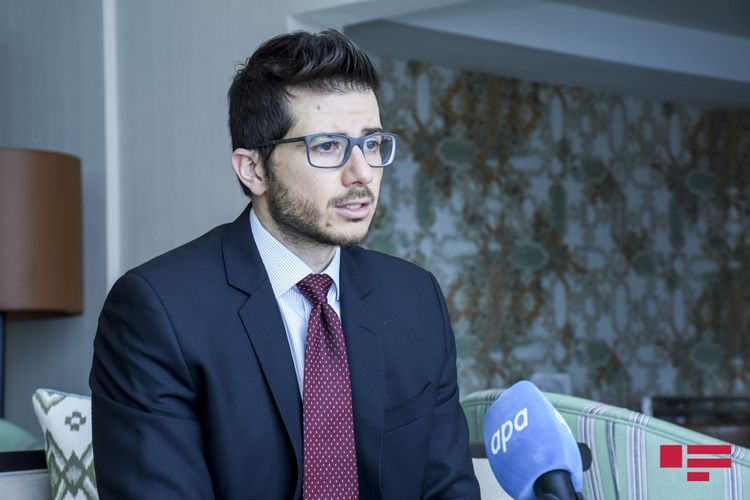
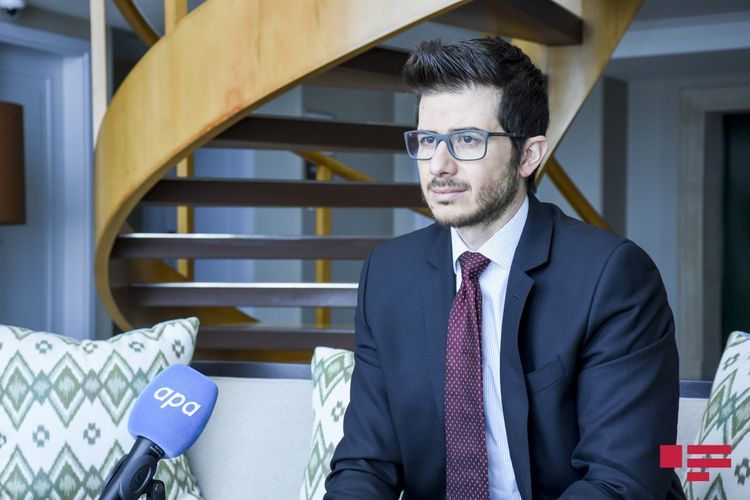
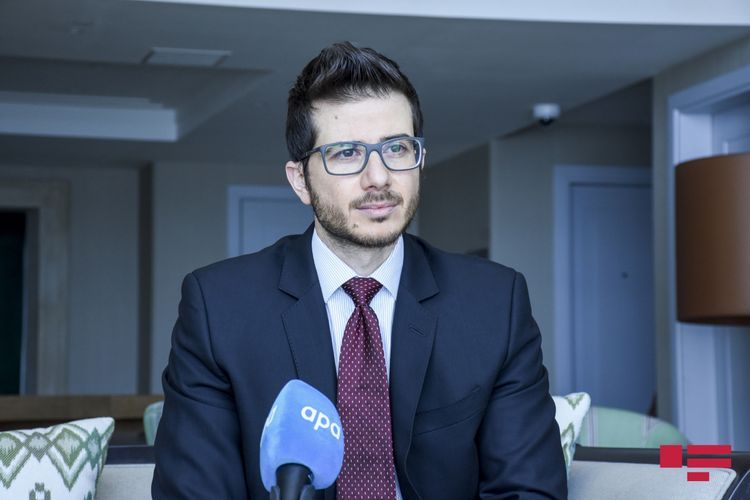
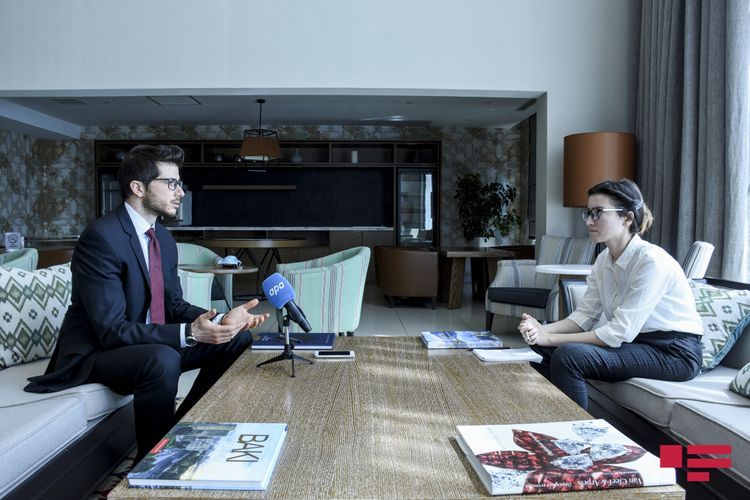
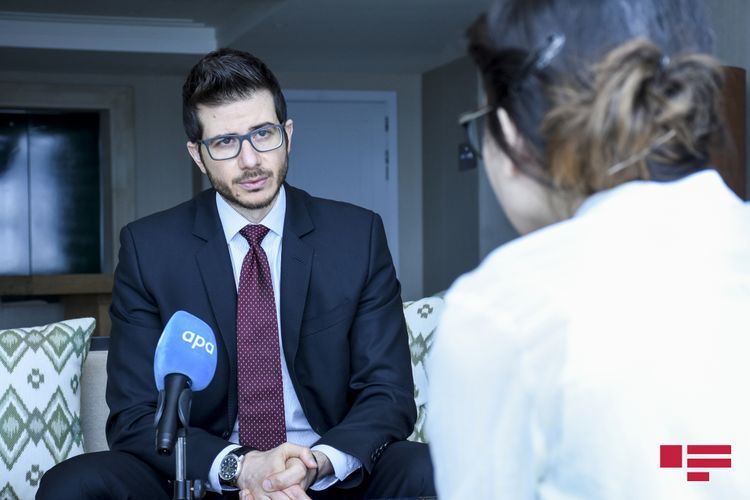
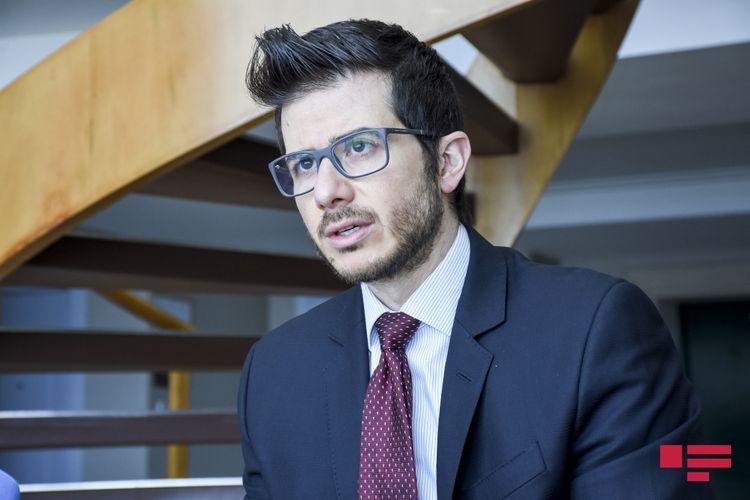
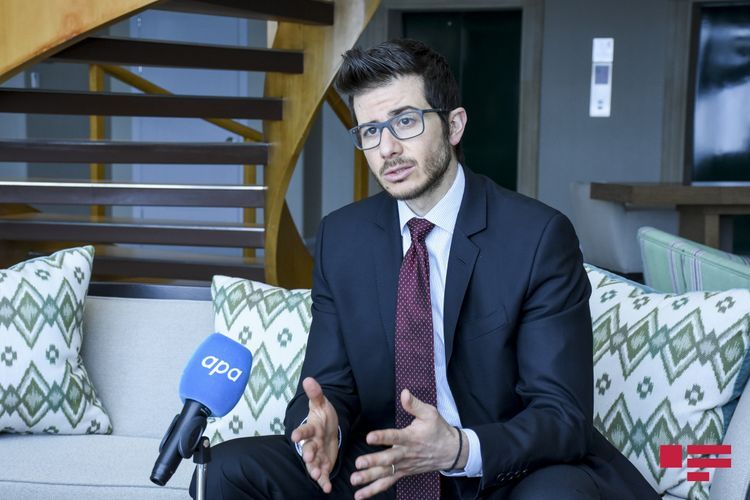
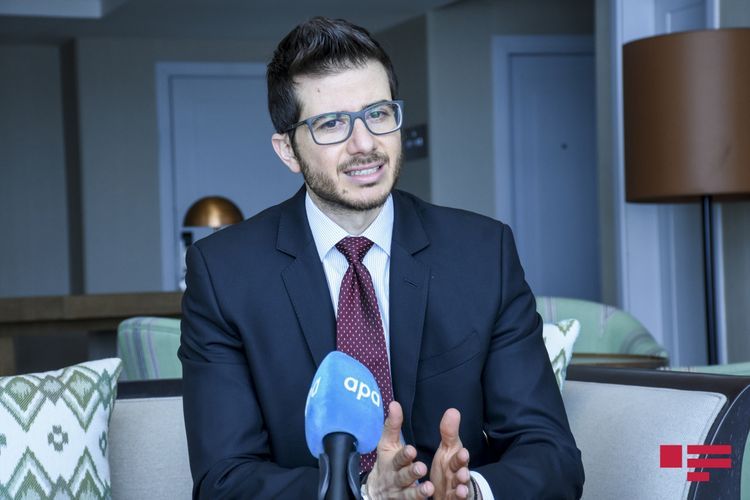
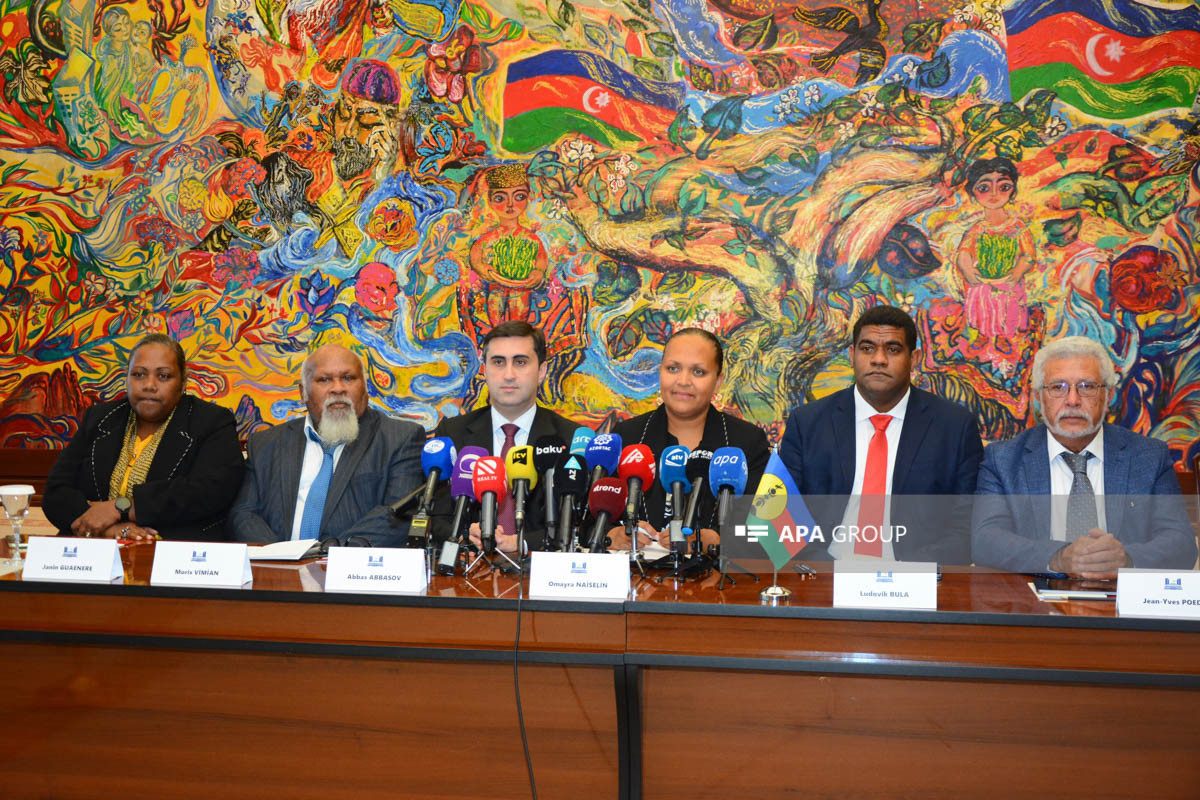
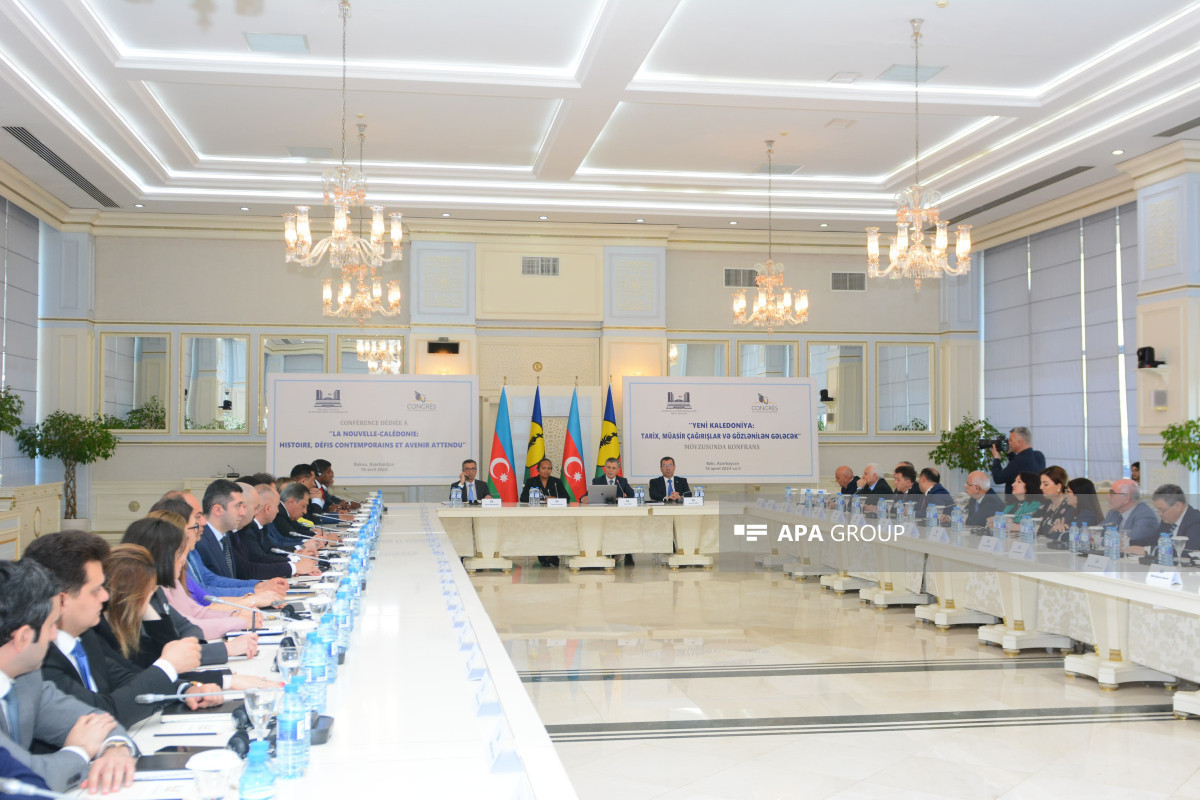 PHOTO'>
PHOTO'>
